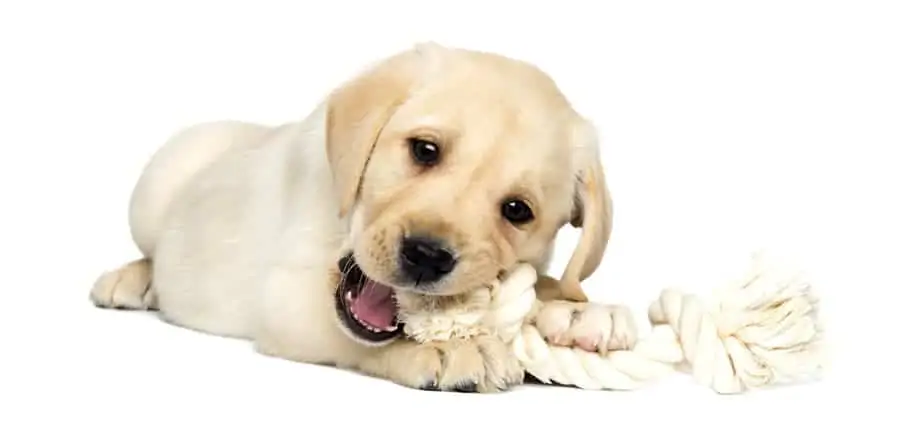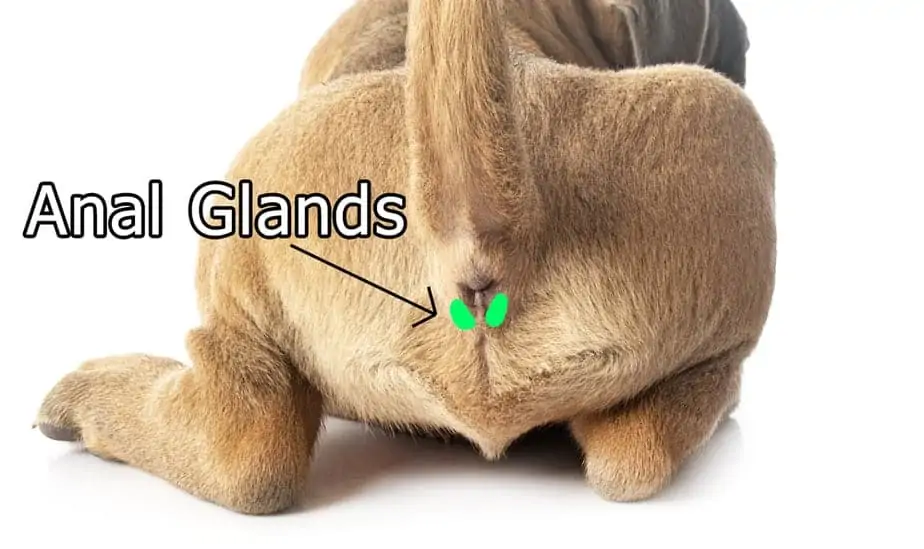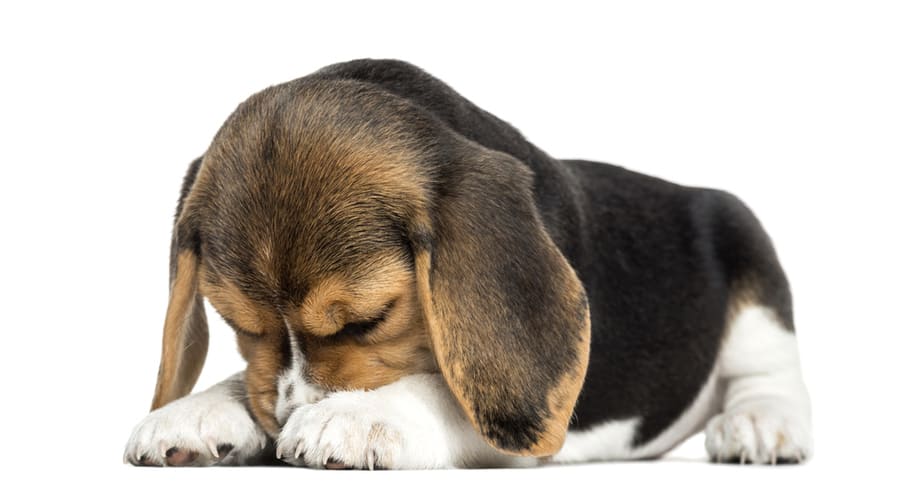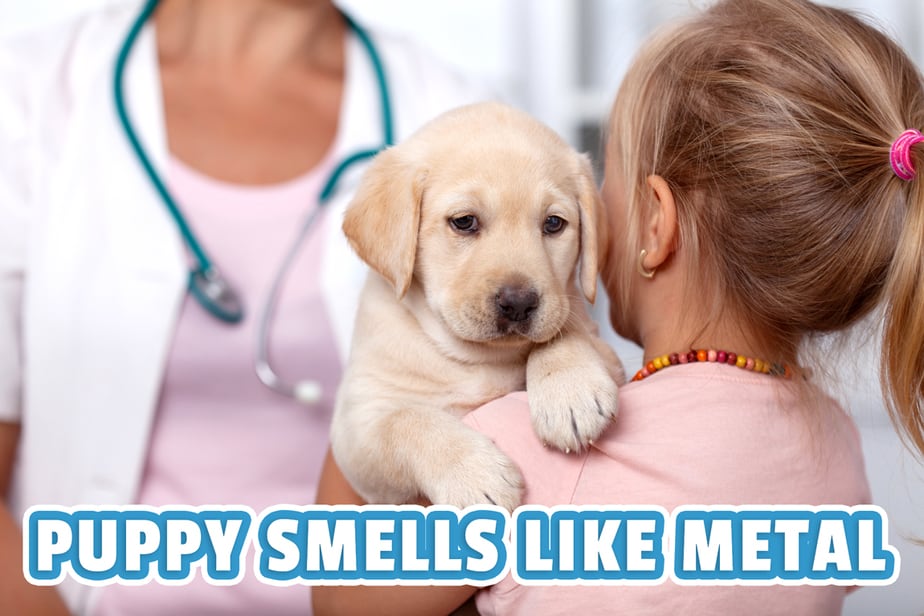Does your puppy smell of iron, pennies, or a handful of change? It can be concerning when your puppy smells like metal. There are a variety of reasons why this might happen, and we delve into what causes it and what you need to do about it.
Teething
Does your Puppy’s breath smell of metal?
Puppies lose their teeth around 4-6 months of age. As they are losing their baby teeth and the adult teeth are replacing them, you may notice a distinct metallic smell coming from their mouth. Sometimes, their mouth may even smell rotten.
This is perfectly normal, though. Due to the bleeding that occurs when puppies are teething, the metallic smell you are getting is likely due to the iron in their blood.
The rotten smell comes from the baby teeth dying and falling out. It can be quite a shock when the sweet scent of puppy breath is replaced with the smell of the mouth of a teething puppy, but it should all pass once they have their adult teeth.

Anal Glands
Does your Puppy’s bottom or poop smell like metal?
If you notice that your puppy’s poop smells metallic, or you find a metallic smelling discharge on their rear end, it may be due to their anal glands.
These glands are two small sacs that sit on either side of your dog’s anus – internally – and leave discharge when they poop.
This discharge tells other dogs about your dog through the scent, so it’s a perfectly normal activity to occur. Anal glands may smell like a variety of things, from metallic smells to fishy smells.
If the smell is only happening when your dog uses the bathroom, it’s likely due to the normal process of expressing their anal glands with defecation.
Sometimes, though, you may find your dog expressing their anal glands outside of when they defecate. This may happen when they are physically stimulated to do so, or when they are very scared.
Our article on dog hemorrhoids discusses anal gland issues more in-depth, and you can read that article here.

There may also be problems with the anal glands themselves, as some dogs are born with anal glands that have an irregular shape.
Other times, an allergy, obesity, or consistent soft stool can lead to the anal glands filling up and becoming impacted since they cannot be expressed naturally.
Signs your puppy’s anal glands are impacted:
-
Problems defecating
-
Scooting on their bottom
-
Red and inflamed anus
-
Bad odor coming from anus area (can be metallic)
-
Swollen anus area
-
Discharge from anus area
If any of these symptoms arise you should visit the veterinarian as soon as possible. If there is an infection, they may require a course of antibiotics.
Did you know that every 6 seconds, a pet owner is presented with a bill of over $1000 for veterinary care for their beloved pet? Be sure to read our post, Is pet insurance worth it? 5 shocking facts you need to know…
Not only are anal gland infections painful, but left untreated, they will develop scar tissue that can lead to future problems.
Your dog’s poop isn’t the only thing that may smell metallic due to anal glands.
As your dog licks themselves to clean themselves or try and relieve the pressure of an impacted anal gland, some of the secretion will end up inside their mouth.
This may lead to you noticing the metallic smell coming from their mouth, instead of the opposite end!
As your dog continues to groom themselves, you may notice the scent has spread all over their skin as well.
Anal gland problems in general are the most common reason why a dog smells metallic, so no matter where you think the smell is coming from, you should consider if other signs and symptoms point to an anal gland infection.
Anal glands can become infected as well, and infection can have a distinct smell as well. Anal gland infections generally follow impactions and can result in a true abscess. When this occurs, the skin surrounding the anus appears swollen and may even rupture, allowing the highly odorous anal gland secretion to be released. Anal gland infections can be challenging to clear and may require culturing to determine antibiotic sensitivity. Anti-inflammatories, pain medication and warm compresses may also be beneficial to dogs suffering from impactions or abscessation. Dr Marti DudleyVeterinarian Comment

Urinary Tract Infection
If you notice your dog’s pee smelling metallic, it’s time to seek veterinary attention to determine if your dog has a urinary tract infection.
Many times, metallic smells may be due to blood in the urine. It’s also possible for ammonia to give off a metallic smell.
The smell may be due to a simple urinary tract infection, or a bigger problem such as bladder stones.
Other owners have also reported noticing metallic smelling urine when their dogs have had a vaginal infection.
In short, dog urine shouldn’t smell like metal.
While it’s normal for poop to have a somewhat metallic smell, due to the expression of anal glands, there isn’t a mechanism like that for urine.
Instead, a metallic smelling urine means you should visit your dog’s veterinarian to determine the cause.
Kidney Failure
Metallic smelling breath and urine have also been noted as a sign of kidney failure in dogs.
This makes sense when you consider that as in a urinary tract infection, your pet may be eliminating blood in their urine, too.
A urinalysis and blood work can be used to help determine if your dog has a urinary tract infection, a kidney infection, or if some other illness is occurring.
You may notice the metallic smelling breath in this case, too. This is because your dog’s kidneys serve to filter out a variety of toxins and excess waste.
When there is a kidney infection or your dog is in kidney failure, the kidneys cannot flush waste effectively.
This leads to a buildup of these materials inside your dog’s body, which can lead to you smelling the metallic smell on their breath or from their urine.
Skin Infection
If you notice the smell of metal overall on your dog, rather than being located at either end, your dog may be experiencing a skin infection.
This may be due to an allergy, including food or environmental allergies, or an infection due to a compromised immune system.
There are a variety of reasons why your dog may develop a metallic smell along with a skin infection.
As with other conditions we’ve mentioned previously, blood may often leave a distinct smell of iron, since it is a component of blood.
If your dog is experiencing raw skin that bleeds, this may be one reason for the metallic smell.
It’s also the case that a variety of bacterial organisms may be living on your pet’s skin and causing the infection. These bacteria can form colonies that leave excretions that smell like a variety of substances, including metal.
Yeast is another common smell associated with many infections, including skin infections.
It goes without saying that you shouldn’t wait to notice a smell before taking your dog to the veterinarian if you find any other signs and symptoms of a skin allergy.
This is one of the many reasons why it’s important to keep up with regular grooming.
Not only will you prevent your pet from becoming matted, but you’ll also notice right away if a problem with their skin does occur.
It’s much harder to find an infection under the coat of a matted dog, since you cannot see the skin without shaving.
It’s also much more likely that an infectious agent will take up home in the moist, dark, environment of your dog’s skin under a mat, than if the coat is kept clean and well-brushed.
Should you be worried about the metal smell?
No, not always. There are a few situations in which your dog may smell like metal and not need veterinary attention.
These two cases are with teething puppies and with normal anal gland behavior.
Outside of the time in which your puppy is teething, from 4-6 months of age, their mouth should not smell metallic. During this time, though, it’s normal!
Determining if anal glands are a problem or not requires looking at a few different factors, since dogs can experience anal gland problems at any point in their life.
If you only notice the smell when your dog is defecating, there’s likely no cause for alarm.
However, most dogs should not leak secretions from their anal glands or otherwise have problems with them.
If you find yourself noticing anal gland fluid itself, or if your dog seems at all bothered, it’s important to take them to a veterinarian so the problem can be addressed.
You might like to read our post: Playing Rough with Your Puppy, is it OK?
Or do you want to know about How much attention you should be giving your puppy?




